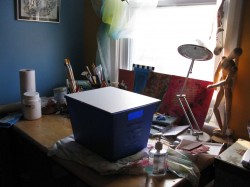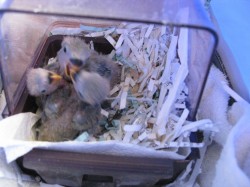 We took the baby lovebirds out of Billie’s cage yesterday morning, and brought them to my house. They’re living inside a parakeet bathtub which is lined with shredded paper and which sits atop a stack of baby towels inside a blue plastic bin on top of a heating pad on the table in my art room. There’s a canvas on top, to keep the heat in and the light out.
We took the baby lovebirds out of Billie’s cage yesterday morning, and brought them to my house. They’re living inside a parakeet bathtub which is lined with shredded paper and which sits atop a stack of baby towels inside a blue plastic bin on top of a heating pad on the table in my art room. There’s a canvas on top, to keep the heat in and the light out.
I’m feeding them with an oral syringe – the kind you give medicine to babies with. They eat KayTee Exact Formula for hand-fed birds at 7am, noon, 5pm and 10pm. It takes about an hour each time to feed them, but California Dreamer says I’ll get faster with experience.
It’s a bit overwhelming. There are so many ways to accidentally kill a baby bird.
First, they’re super susceptible to bacterial infections. So you can kill them by not disinfecting your equipment after each feeding.
On the other hand, you can kill them by disinfecting the equipment with a toxic disinfectant. (I’ve been phoning and emailing all kinds of bird strangers in the area, trying to find out what is a bird-friendly disinfectant and where I can get it. No-one’s gotten back to me yet. Do any of you know?)
You can kill them by feeding them formula that’s a) too hot or b) too cold. It’s supposed to be between 102 and 107 degrees farenheit. (So far my greatest challenge is trying to keep it in that range while feeding the babies. I have to keep warming it up and cooling it off.)
You can kill them by feeding them too fast, which causes the formula to go into their lungs.
You can starve them by not feeding them enough.
You can kill them by feeding them too often. If their crops (pre-digestive holding tanks) don’t get a chance to completely empty every day, the food in there can go bad and cause an infection.
You can kill them by turning your back to reheat the formula and they fall off the table.
They’ll die if they get too hot or too cold. They need to be kept in a very warm room. But not too warm.
You can kill them by forgetting to close the door to the art room, thereby allowing an exceptionally curious and persistent cat to get in.
 The good news is that they’re still alive, and they’ve each gained two grams. (They weigh between 26 and 38 grams each – that’s just under an ounce to almost an ounce and a half. I can already tell I’m going to get totally obsessive about their weight. Expect spreadsheets.)
The good news is that they’re still alive, and they’ve each gained two grams. (They weigh between 26 and 38 grams each – that’s just under an ounce to almost an ounce and a half. I can already tell I’m going to get totally obsessive about their weight. Expect spreadsheets.)
My heart melts whenever their little toes curl around my fingers while I’m feeding them, or when they gaze at me through their newly-open eyes. They’ve gone from looking like the fetuses on the anti-abortion posters (as Grace said) to looking like sweet little baby birds.
As for Billie and Lester, they’re back together in the original cage now. (You may recall that Lester was banished last week for trampling Sweet Baby Bongo to death.) Even though Billie was absolutely and utterly devoted to her babies ever since she laid those eggs, she was rather spectacularly unconcerned about their sudden disappearance. We absconded with the whole nesting box while she was out flying around the house, and when she returned to the cage she seemed momentarily puzzled. Then she had breakfast and a drink and started playing with the new toy we put in the cage.
Life goes on.
















Yay! Spreadsheets!
– RG>
I know, eh? So exciting!
Hi Zoom, I left you a message in the updates on Ustream but will repeat it here. If you put the babies in a coolwhip tub or similar about 2 1/2″ high with a paper towel in the bottom and some pine shavings it this will make it easier for you to feed and keep them contained. It is very hard to feed babies in your hands or trying to feed them on a tabletop. As they get bigger you find the right size container to move them up to. I left my e-mail if you need any help, more than happy to give you some tips.
Your title had me anxious for a moment!
I Googled non toxic disinfectants and it came back with hydrogen peroxide, which you can get at the drug store. You might need to dilute it – I’d look into that too. Or rinse it off, or something like that.
I have had a wild chickadee perch on my finger once or twice and it is an amazing sensation.
Oh you are so brave – I’d be terrified I’m going to do something wrong. Here’s to everything going right!
Why did you have to remove them from the mum? (I probably missed some explanation somewhere.) Will they be returning to the cage at some point or what’s the plan once they’re grown? How’s Duncan enjoying the new snack-sized strangers?
Hi Zoom, the brothers who operate Critter Jungle in the Hampton Park Plaza are very good with birds and may be able to offer some advice.
I have been hand-feeding an embryonic baby squirrel for the past month, Oscar, since he was two-days old. There were similar concerns about him vis-a-vis food, warmth, aspiration, constipation, the whole nine yards. But he’s thriving. http://www.babysquirrelOscar.blogspot.com
Meanwhile, sleep-deprivation is alive and well at my house.
It’s a huge responsibility but worth the effort.
Good luck with this challenge!
Best wishes, Shannon
California Dreamer – thank you once again. You’re my baby bird mentor! I am feeding them in a bunnykins bowl. Also, I bought pine shavings today, and you’re right, it’s better than shredded paper.
Julia, I’m going to call the vet tomorrow to find out what kind of disinfectant they use around baby birds. I stood very quietly out by my bird feeder (when I lived in Wakefield) every day for an hour, with my hand outstretched, waiting for a chickadee to trust me enough to land on me. Eventually they did, and you’re right, it’s amazing.
Valerie, I”m still scared, but I’m starting to get the hang of it. I’ve done it 21 times now (7 meals times 3 birds) and it gets easier every time.
XUP, I removed them from the parents because hand-raised baby birds make better pets…and these birds are destined to spend their lives being pets. They’ll find it easier to establish a bond with people. They can’t go back to their parents (even if I need a babysitter for an evening), because lovebird parents have an all or nothing attitude towards their kids. Once you’re out of the nest, that’s it….you can’t go home again.
Shannon, I love that store. We recently started going there for dog and cat food and also for excellent advice. Plus we love to visit Lulu, the giant red and blue bird. We stopped by there today to ask about disinfectant, but they were closed for the holiday. Your baby squirrel is absolutely amazing. Good for you for taking him on! How much longer til he’s independent? (My mother raised three baby squirrels one summer – she usually took in groundhog babies, but the Wildlife Centre was overwhelmed with orphaned baby squirrels that summer. If I remember correctly, she found them more demanding and more hyperactive and highly strung than groundhogs…plus they had sharp claws.)
You’re not gonna kill the birds.
I too am curious why you didn’t leave them with Billie?
Nevermind – just read the answer.
I am amazed by Shannon’s squirrel blog
Thank-you for the positive response about Oscar. The amazing thing is that no matter a baby lovebird or squirrel, the patient caring that it takes is the same.
Zoom, you’re doing a great job!
Hi Zoom, glad the container is working for you. I had posted on Ustream that Nolvasan by Fort Dodge is the best disinfectant to use. Most veterinary hospitals and kennels use it. Some bird breeder would even add a few drops to the drinking water for their birds, it will not hurt them. It is a bit expensive, but it is what I have used for years. Just add enough to turn the water a pale blue in your soaking container, and change it every 24 hours. Because Lester and Billie fed the babies, they have passed on the good flora to the babies so they will have a pretty good immune system.
BTW I use Nolvasan to clean my cages and anything I want to disinfect that I do not want to use bleach on. Nolvasan-S is scented.
Robin, thank you. I appreciate the vote of confidence!
Deb, I know, I read the whole thing from start to finish yesterday. It’s astonishing that she was able to keep that little guy alive at such a young age.
Shannon, I’m doing my best. I’m just blown away by your squirrel baby.
California, I saw your comment about Nolvasan, but I can’t find a distributor up here. The local pet stores are telling me to use hot water, or hot water and vinegar. Do you think that’s good enough? If not, I just heard from a local breeder who recommends Quato 44, from Swish.
Hi Zoom, Hot water is not enough. Some people boil their feeding utensils, but again the plastic will get hard and crack. I get the Nolvasan off the internet, Amazon is good. I wouldn’t bother unless you are going to do this again. I have never heard of Quato 44 but if local breeders use it then I am sure it is good. I think I would just wash all feeding utensils in very hot water with dish washing liquid. I would not let items soak till next feeding. Wash, rinse and let all items air dry and see how that works. Your babies have a good immune system from their parents. I wouldn’t worry they will be fine. Your doing great.
I’ve fed many baby birds — lovebirds, cockatiels, parrotlets, etc. — and never disinfected the utensils. Just cleaning them in hot water will be good enough.
Do you have a small metal bowl that you can use to keep the food in? If so, get a plastic bowl a bit larger and put some really hot water in it, then float the metal bowl in that. (Like a double boiler?) That will help keep the food warm. Be sure to stir it well each time you fill the syringe to even out the temperature. I never worried about exact temperature … use the “baby bottle on the inside of the wrist test.”
You’re doing great — the first day is the hardest!!
Hi, I am from NJ so I don’t know what if any bird stores you have in your area but if you call around to well estabilished bird stores you could probably get any info you need because they hand raise baby birds all the time